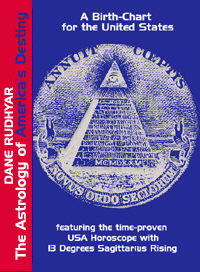 |
| Home | Bio | Art | Music | Literature | Civilization & Culture | Philosophy of Wholeness | Theosophy & Spirituality | Astrology |

THE ASTROLOGY
OF AMERICA'S DESTINY A Birth-Chart for the USA by Dane Rudhyar, 1974 THE ASTROLOGY OF AMERICA'S DESTINY Table of Contents
1. The Birth of the United States
as a Collective Person 2.The Roots of the American Nation Page 1 Page 2 Page 3 Page 4 Page 5 Page 6 Page 7 Page 8 Page 9 Page 10 3. America's Place in the Cosmic Process 4. A Birth Chart for the United States of America 5. Two Hundred Years of Growth Through Crisis 6. A Chart for the Beginning of the Federal Government 7. America at the Crossroads 8. Prospects for the Last Quarter Century Illustrations • George Washington receiving the horoscope of America from the Angel Gabriel • The Reverse Side of the Great Seal of the United States • A Chart for the United States of America • A Chart for the Beginning of the Federal Government • A Chart for Richard M. Nixon • A Chart for the Twentieth Century |

CHAPTER TWO:
The Roots of the American Nation - 8 In her provocative book Isis Unveiled (New York, 1877), H. P. Blavatsky states that a direct connection existed between the speculative Masonic movement of the eighteenth century and "the last of the Rosicrucians and alchemists," Elias Ashmole, who was "admitted to the freedom of the Operative Masons' Company in London in 1646. [He died in 1692.] At that time Masonry was not what it became later; it was neither a political nor a Christian institution, but a true secret organization which admitted into the ties of fellowship all men anxious to obtain the priceless boon of liberty of conscience and avoid clerical 'persecution." (Vol. 1, P. 349. Blavatsky's source is a book published in 1666, entitled Natural History of Staffordshire, by Plot.)(6) Freemasonry spread rapidly through the American Colonies. At least fifty of the fifty-six signers of the Declaration of Independence were members of Masonic lodges, and the same is true of a rather large number of generals in Washington's army. During the nineteenth century Freemasonry's influence spread through the political world in Europe and America, and over the years Masonry became mainly a fraternal organization with humanitarian purposes. But for over two centuries it acted as a powerful influence against the political and social power of organized religion. The dogmatic Church, Catholic or Protestant, ever seeking to dominate the minds and the feelings of men, women and children, was considered by the leaders of the American Revolution a remnant of the age of feudalism and as inimical to the growth of a truly New World as the institution of an absolute monarchy. Perhaps more than anyone else, Thomas Paine was aware of the need for total repudiation in nascent America of all that constituted the inherited foundations of the old order. In his book The Age of Reason, Paine voiced strong opposition to all forms of organized religion based on a set of dogmatic and unprovable assumptions, and for this he was to some extent persecuted, even though he had been such an important factor in the liberation of the Colonies and in keeping up the morale of the people and the army during the War of Independence.(7) The following statement in the Preamble of the Rules of the "Society for Political Enquiries" (February 1787) has been attributed to Paine, and it certainly expresses his preoccupation with bringing to the new American society a truly effective freedom from the European past: Accustomed to look up to those nations, from whom we have derived our origin, for our laws, our opinions and our manners, we have retained with undistinguishing reverence their errors with their improvements; have blended with our public institutions the policy of dissimilar countries; and have grafted on our infant commonwealth the manners of ancient and corrupt monarchies. In having effected a separate government, we have yet effected but a partial independence. The revolution can only be said to be complete when we shall have freed ourselves no less from the influence of foreign prejudices than from the fetters of foreign power. 6. The Rosicrucian Movement, according to the occult tradition, was started by Christian Rosenkreutz, who lived around 1400 A.D. It came to public attention only during the sixteenth century, and it is most likely that Francis Bacon belonged to it. Whether or not the present-day groups in the United States which use the name "Rosicrucian" are true and direct descendants of the old Order is a disputable question. Yet there seem to have been Rosicrucians in Europe during the nineteenth century and presumably later, who at least had kept alive the ancient tradition and symbols. Return 7. Thomas Paine (1737-1809) was bom in Thatford, Norfolk, England. He came to Philadelphia at the age of 37 with a letter of recommendation from Franklin. He founded a "Society of Theophilanthropists," and his books are filled with social concepts which are only gradually being applied. Details on his life and works can be found in a two volume biography by Convey Moncure, The Life of Thomas Paine. Return By permission of Leyla Rudhyar Hill Copyright © 1974 by Dane Rudhyar and Copyright © 2001 by Leyla Rudhyar Hill All Rights Reserved.  Web design and all data, text and graphics appearing on this site are protected by US and International Copyright and are not to be reproduced, distributed, circulated, offered for sale, or given away, in any form, by any means, electronic or conventional. See Notices for full copyright statement and conditions of use. Web design copyright © 2000-2004 by Michael R. Meyer. All Rights Reserved. |
 |